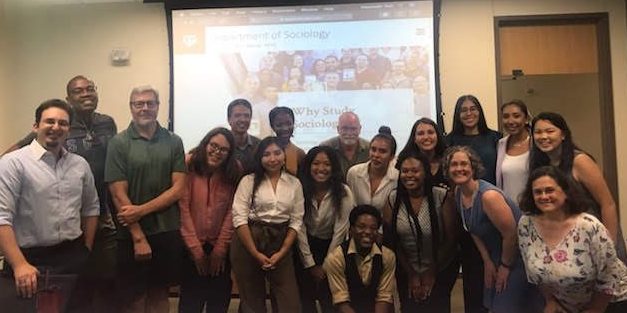NSF REU Site: Research in Social Inequality and Social Problems – Projects and Faculty
We are proud to announce that the REU program will be back in Summer 2024. Applications will become available on this website on December 1, 2023, and will be due February 19, 2024.
The Texas A&M Sociology Research Experiences for Undergraduates (REU) offers summer fellowships to do world class research.
This program was funded by the National Science Foundation (NSF) under grant #1757813 for summers 2018, 2019 and 2021, and under grant #2244231 for summers 2024, 2025 and 2026.
Faculty Research Mentors and Research Projects

The faculty research mentors for this project are accomplished researchers with expertise in the area of social disparities. They have published extensively on this topic and collectively have mentored hundreds of undergraduate and graduate student projects in this area. They have supervised many dozens of doctoral dissertations and supervised hundreds of students in writing articles and reports and making presentations at professional conferences. The following provides a brief discussion of some of the mentors and the research project opportunities they will provide to the students in our program. Each summer there will also be additional opportunities that are available, contingent on mentors’ availability.
Mary Campbell
Dr. Mary Campbell (Professor, Sociology; Executive Director – TXRDC) has interests in racial identification and racial inequality, with a special focus on multiracial groups and interracial relationships. She has mentored 12 undergraduates working on research projects, several of whom went on to win research awards for their projects. She will mentor students on projects testing how changes to the measurement of race and ethnicity would affect our estimates of racial and ethnic inequality in the United States. Undergraduate researchers will participate in survey analysis using data collected by the Census Bureau and the Racial and Ethnic Studies Institute to test how this new information may shape our estimates of racial and ethnic inequality. For example, they will test research questions such as: how does reported racial discrimination vary by the composition of the communities in which people live?
Robert J. Durán
Dr. Robert J. Durán (Associate Professor, Sociology) has interests in criminology and race, urban ethnography, and juvenile delinquency/justice. He plans to have students collect officer-involved shooting data for several large cities in Texas (Austin, Dallas, El Paso, Houston, Fort Worth, and San Antonio). Student research projects could focus on any one of these cities, investigating the circumstances of officer-involved shootings and analyzing patterns.
Sarah Gatson
Dr. Sarah Gatson (Associate Professor, Sociology) studies community food security and food justice in the Brazos Valley. Using both a research and service-learning approach, she and her team of researchers investigate historical and contemporary community food security and access to agriculture. They build and help maintain residential and third-space food gardens in the Brazos Valley, using a participatory action/multi-sited & extended case method ethnographic approach.
Patrick Rubio Goldsmith
Dr. Patrick Rubio Goldsmith (Associate Professor and Director of Graduate Admissions, Sociology) has research interests that focus on how residential segregation and school segregation impact racial/ethnic inequality in educational, socioeconomic, and residential outcomes. He will involve students in projects that use data sets from the National Center for Educational Statistics or other national data sets. The student project will use the Educational Longitudinal Study, a data set widely used in education research, to assess how residential changes impact students’ educational progression and attainment. Example research questions would be “Do Black/Latino students who move from predominantly Black/Latino neighborhoods to predominantly White neighborhoods, or the reverse, differ from Black (Latino) students who reside continuously in White or Black/Latino neighborhoods on educational outcomes?”
Nancy Plankey-Videla
Dr. Nancy Plankey-Videla (Associate Professor, Sociology) focuses on issues around immigration and the deportability of migrants, workers’ rights and labor issues, and intersectionality. She has participated in the most recent REU, mentoring students conducting interviews with local day laborers about labor and migration conditions in the local area. She plans to work with students on research that centers around the concept of citizenship, the process of choosing to become a United States citizen, and mobilization for labor equity.
Harland Prechel
Dr. Harland Prechel (Professor, Sociology) has two research projects that are currently accepting new students. (1) The organizational and political-legal sources of class-based inequality. This project uses historical methods that examines government documents and other historical data. (2) The organizational and political-legal and community bases of environment pollution with a focus on greenhouse grass emissions and toxic emissions. In the current stage, this project employs primarily quantitative methods.
Selected Research Facilities
Our REU Site will draw on the combined resources of the broader university (TAMU), the Sociology department, and multiple research centers (described below).
Students will have full access to the excellent research library at Texas A&M University and multiple options for seminar classroom space and conference rooms. They also will have access to relevant software and hardware in the SOCI Computer Lab and GIS Labs. These labs will give students access to state-of-the-art computer workstations with research related software, high-speed network connections, and printers and other relevant peripheral equipment (e.g., scanners, plotters, etc.). Students also have support from the SOCI and CLA IT support staff.
As mentioned above, faculty mentors are affiliated or directing a host of centers around the campus, which means students, will have access to these facilities and expertise as part of this REU program. Some of the centers include the following:

